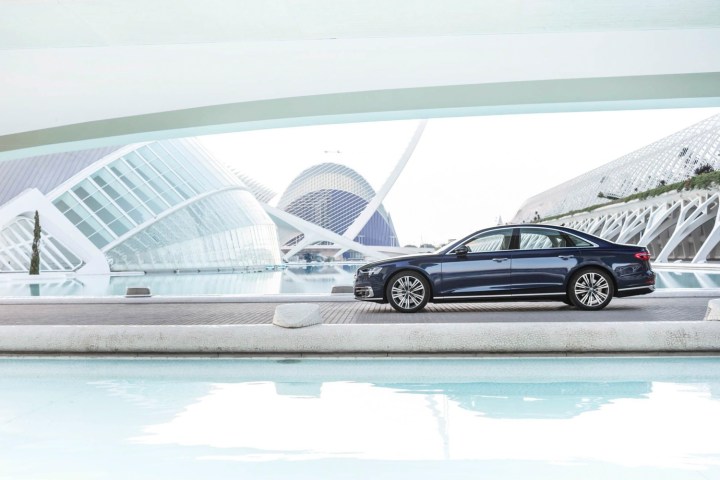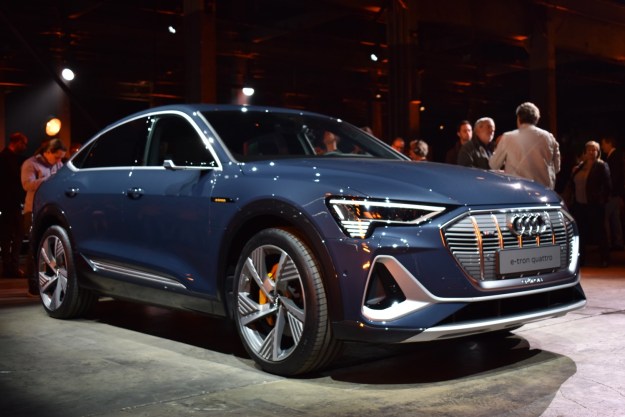
”We’re going to have battery-electric vehicles one after the other.”
“It’s not something where at one point or time you see a quantum leap of functionality and all of the sudden autonomous drive is there in all of its beauty,” Peter Mertens, Audi’s board member for technical development, told Digital Trends. He added it will take “significant time to go from level three to level four.”
It’s a tedious, step-by-step process that involves working with the relevant authorities, gauging user acceptance, and logging millions of miles on test cars to ensure every system works as planned in countless conditions.
But as the company works to drive driverless tech, another transition is simultaneously taking place. And the electrification of Audi is just as complex.
Going electric from head to toe
As it makes its cars increasingly autonomous, Audi is also making huge investments in electrification. The Volkswagen Group – which Audi has been a part of for decades – has pledged to electrify all of its brands by 2030, meaning every model in the portfolio will have an electric motor. That’s a tall order, but Audi is eager to step up to the challenge.

“We are prepared. [The announcement] doesn’t mean any change for Audi, we are absolutely on track,” Mertens affirmed. In fact, Audi’s electrification strategy will be a little bit more aggressive than the rest of the group’s. The offensive will begin next year, when the four-ring brand introduces a battery-powered crossover that will compete in the same segment as the Tesla Model X.
It won’t be Audi’s very first production electric car — that honor goes to the experimental R8 e-tron — but unlike its sports car sibling, the soft-roader will be a volume model. We’re told it will look a lot like the e-tron quattro concept presented two years ago at the Frankfurt Auto Show. Buyers will have several range and performance options to choose from.
Engineers are also exploring natural gas and hydrogen fuel cells.
It will be closely followed by a second, sportier electric model inspired by the recent Elaine concept. “Shortly after that we’re going to have battery-electric vehicles one after the other, cranking out a lot of vehicles,” Mertens revealed. He expects a third of Audi’s global sales in 2025 will come from electrified vehicles, an umbrella term which covers mild hybrids, plug-in hybrids, and battery-electric models. RS-badged high-performance models built by Audi Sport will get electrified, too, though executives haven’t decided whether to start with full electric cars or plug-in hybrids.
Developing electric technology from scratch is expensive, so Audi is teaming up with sister company Porsche to design a platform capable of underpinning high-performance battery-powered vehicles. “It’s one of the big programs in the Volkswagen Group,” Mertens said. “We are responsible as a lead developer, and strongly cooperating with our colleagues [from Porsche’s research center] in Zuffenhausen.”
More than one way to electrify a cat
Electrification is only one way to reduce emissions. Engineers are also exploring other technologies like natural gas and hydrogen fuel cells. Audi already sells natural gas-powered models in Europe, like the A5 g-tron, but there are no plans to sell those in the U.S. due to a weak infrastructure and a general lack of demand from consumers. But someday, hydrogen-powered fuel cells that emit only water vapor could be used as a car’s main source of power, or as a range extender in a plug-in hybrid drivetrain.
Motorists are unlikely to give up gasoline if they have to go out of their way to charge a car’s battery, or if they have to worry about running out of electricity before reaching their final destination. Charging at home or at work is ideal, but Audi is investing a sizable amount of money into building a network of public charging stations in the U.S. and in Europe.
On our shores, it plans on rivaling Tesla’s growing Supercharger network (which may soon be solar-powered) by building between 200 and 300 charging sites on major highways across the nation, and over 700 sites in densely populated urban areas. The stations will all be operational by the time the e-tron arrives in showrooms in early 2019.
Mertens believes electric cars will continue to use lithium-ion battery packs in the coming years. Solid state batteries are at the embryonic stage of development, and they can completely change how we view electric vehicles thanks to a longer driving range and ultra-fast charging. They’re at least five years away from merging into the mainstream, but the future of the electric car looks bright in Audi’s home town of Ingolstadt.
Editors' Recommendations
- Audi Q6 e-tron ushers in the automaker’s next EV phase
- 2023 Audi Q4 E-Tron first drive: the predictable and traditional EV SUV we need
- Audi’s electric 2022 RS E-Tron GT is a concept that escaped the drawing board
- Here’s how Volkswagen plans to electrify America’s most popular car segment
- Here’s how Audi increased the electric E-Tron’s driving range



